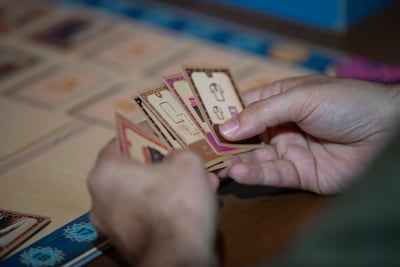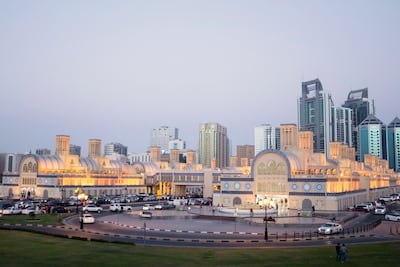The year is 1978 and the Sharjah Central Souk has just opened. You are vying for the chance to open a store in what has immediately become the emirate’s most esteemed commercial location.
The competition is stiff, however, and there are other merchants to consider. Some may inadvertently help you in achieving your goal. Others will actively try to undermine your efforts. The business world can be cruel and you’re advised to keep your wits sharp in the scuffle.
This is the premise of Sharjah: The Board Game. Released a few weeks ago, the game was developed by brothers Hamid, Mohamed, Majid and Ali Al Bastaki. The latter three are also the co-founders of Racks, the popular board game cafe in the emirate, and have released the game under that brand.
The rules have been thoughtfully conceived so players will have a novel experience every time they play. Designed to bring together between two and five players, the game starts at a relaxed pace. Players place their colour-coded chips in one corner of the board and begin with four dirham tokens, two objective cards, as well as two action cards.

Naturally, building shops is key to winning the game. Players are awarded points for each of the shops they build, allowing them to move forward along the margins of the board. There are five categories of shops including jewellery, antiques, carpets, clothing and electronics. The latter four are worth a point each and jewellery – being more expensive to build – is worth two points.
The objective cards, however, are what lets players accumulate more points – and quickly at that. The cards each present a triad of shops in a particular order. If players build the shops in a horizontal pattern, they are awarded five points. Building them perpendicularly offers three points.
Players rotate through their turns – drawing dirham tokens, building shops or playing action cards. While relatively more languid early on, the gameplay quickly becomes more dramatic as players who were lagging suddenly jump to the forefront.

The game becomes brisk and heated. Objectives are thwarted, while other players trying to build their shops in a particular order unwittingly help you achieve your own goals. Action cards have the potential to completely upend a game, letting players move around shops or entirely remove them from the board. They can make other players skip a turn, or even let them pick out a shop for free.
While each brother has his account of the game's inspiration, Ali traces his to the German state of Thuringia. As a mechanical engineering student, he visited as part of an education programme and spent six months living with a German family.
They spoke little English and Ali didn’t speak much German either at the time. The language barrier was vast, but the group found a way to bridge the divide. Every evening before dinner, they’d play board games.
“Those board games transcended all language barriers between us,” Ali says. It was specifically one game, called Marrakesh, that the group bonded over. The game revolved around a carpet souk. It featured a main character named Azzam.

“It had the essence of Morocco. Whenever we played it we used to talk about the Moroccan culture and the different Arab cultures,” Ali says. “We started communicating through the language of the game itself. I started understanding them and their culture, and they started understanding me and my culture through board games. It was a magical, amazing experience, and we used to do it daily.”
It was partly due to this bonding experience that Ali, along with his brothers, decided to open Racks in 2020. The cafe initially opened in a more remote location outside of Sharjah and has since moved to the new bustling boulevard of Aljada.
The cafe features an impressive and idiosyncratic dessert menu, including its signature date cake ice cream, alongside more traditional offerings. The space is segmented into several areas, featuring outdoor seating, private booths as well as a majlis-type section. However, the highlight is its wall-to-wall offering of board games, from popular, instantly recognisable titles to more obscure ones.

Ali says the cafe’s service was designed as a performative experience. This is alluded to by how the establishment designates its staff as "cast members". To interview for a job at Racks is to audition. The areas accessible to visitors are labelled onstage. The kitchen and sections limited to staff access are dubbed backstage.
Employees who tend to customers and teach them the rules of the different board games are called Game Masters. Each Game Master has a particular speciality, and there are colour-coded stickers on each board game to designate their complexity. Several games at Racks that have been inspired by cities, such as Copenhagen, Tokyo and Istanbul.
Sharjah: The Board Game is the latest addition to these offerings, and Ali says it has quickly garnered popularity among Racks’ guests.

“A year after opening Racks, my brother Mohamed looked around and saw that there are many board games that celebrate different cities, and then he said: ‘Why not Sharjah?” Ali says. “When he said that I remembered my experience with the German family.”
The brothers then set out to create a game that would capture “the beautiful essence" of the emirate and create “a world-class board game that can favourably compete with the leading board games".
The brothers went through several iterations and prototypes, developing the rules so that the game would not become repetitive and would always offer an element of surprise. “One important factor is repeatability,” Ali says. “There are some games that you’ll play just once and others, where you feel if you master certain tactics [you’ve overcome the game]. We didn’t want that.”
They conceived the game’s aesthetics meticulously, Ali says.
“We didn't start in anything in terms of design up until the rulebook was completed. We thought since we had everything except the design set that it would take a few months to design. It took a year. We finished at the end of 2023. It was a journey.”

Placing the game within the Central Souk seemed like an obvious choice, the structure was somewhat emblematic of Sharjah and had several unique architectural elements that would eventually find their way into the game. The brothers visited the Central Souk several times, taking photographs and developing the game’s designs based on its landmark architecture.
“The Central Souk is Sharjah,” Ali says. “It has all the elements, from the Islamic architecture and the beautiful art to the plants. Even the lights. Whenever you see the souk, you know it's Sharjah.”
The board game’s layout was designed by taking into consideration the top-down view of the souq, with two parallel structures running alongside each other. Pointing to different design elements within the board, Ali says: “These are the tiles that are inside the souk, the tiles in the pedestrian bridges. The colours and border lines were inspired by different parts of the souk. Even the cards, the back of the cards are the windows of the souk.”
Ali says he hopes Sharjah: The Board Game won't be the only original game to be developed under Racks' name, and hints that he and his brothers have several ideas for further titles, saying he believes they have cracked the code on what makes “an exceptional board game".
Sharjah: The Board Game is currently available for purchase at Racks and its website for Dh189. However, the game will also soon be available in other locations, including Kinokuniya

